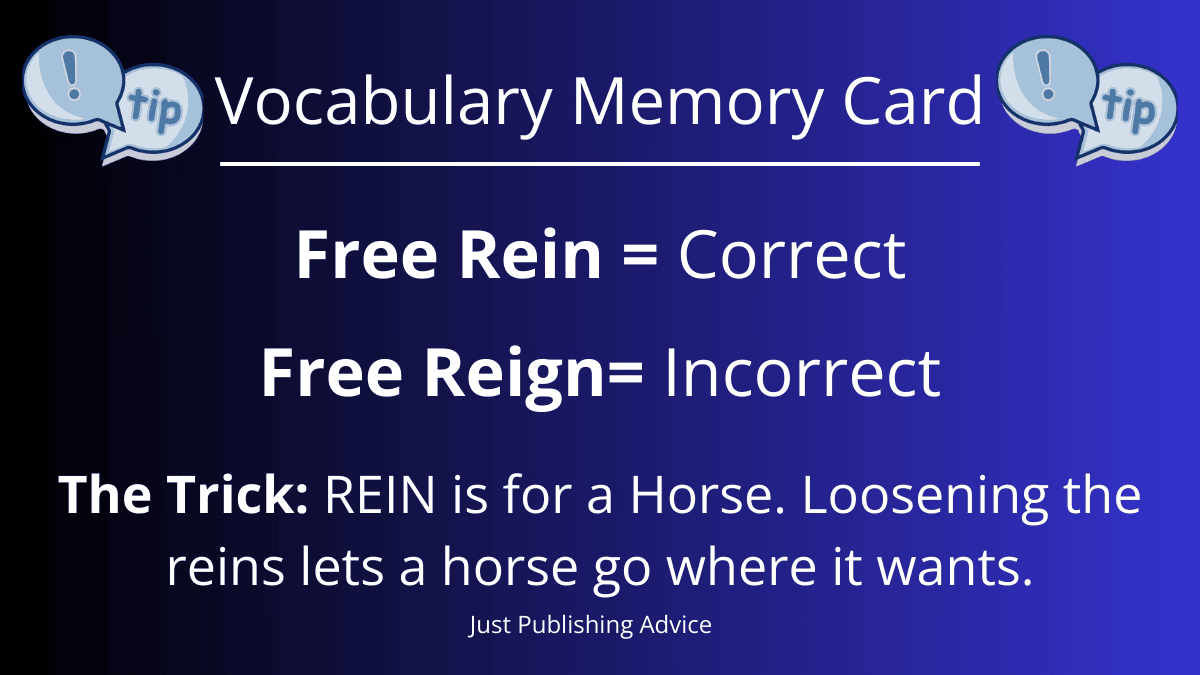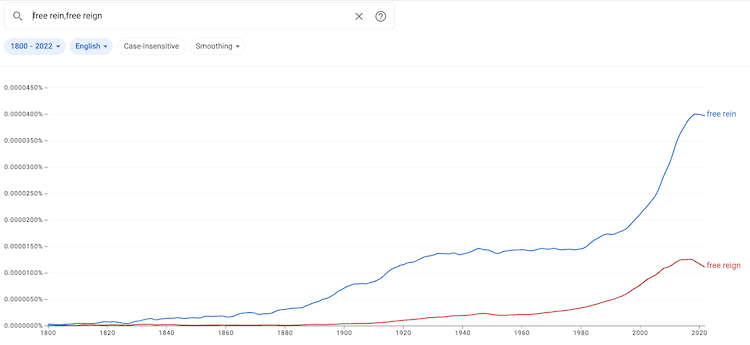
Is it free rein or free reign?
The correct phrase is free rein.
It comes from the world of horse riding, where a rider would loosen the reins to allow the horse to move freely.
While “reign” (meaning to rule like a monarch) sounds like it might fit, it is always a misspelling in this context.
The correct phrase: free rein

The term comes from riding a horse. When a rider loosens the reins, it tells a horse that it is free to move.
It can choose where or how fast or slow it wants to move, possibly in any direction. So, the literal meaning of free rein is that there is no restriction or constraint on a horse.
When we use the expression figuratively, it generally indicates a similar type of freedom.
The author gave his imagination free rein and ended up with a story full of unexpected twists.
During the summer vacation, the kids were given free rein to play outside all day.
You can also use opposite expressions to indicate a lack of freedom with tight and short reins.
The CEO kept a tight rein on the company’s finances.
The teacher had the students on a short rein during the excursion.
It’s such a common fixed expression and has many uses related to liberty, autonomy, or independence.
The confusing phrase: free reign
It’s easy to conclude that free reign also has the sense and meaning of freedom.
Reign is a word linked to royalty and the powers of kings and queens to do as they wish. They have no boss, so there’s no one to tell them what to do.
If someone has unrestricted power, they logically have free reign and total freedom to act.
Using my earlier example of a CEO, it would seem logical to use this form to indicate the same sense of freedom or lack of restraint.
The CEO has free reign over the company’s finances.
You often see the phrase used in print.
The BBC is given free reign to broadcast matters of political, religious, or industrial controversy. The Guardian
When it comes to foreign work, it’s a free reign. The Guardian
The goal is to create a “virtual office” without walls: although these employees have free reign to drop in at the main office, they work mostly at home… New York Times
In Florida, Huberdeau had free reign to go all out on offense. New York Times – The Athletic
From these few examples, it’s easy to see why the expression makes sense, even though it is technically incorrect.
When you look at the Ngram usage graph below, it tells a similar story. However, rein is used more frequently.

Unlike some confusing words, this one seems like such a natural assumption that free reign is logical when talking about unrestrained control or freedom.
Can you use either form?
I suppose it depends on if you are a purist or not. It’s similar to the lack of perceived difference between sleight and slight of hand.
I would choose to use the correct form, but that’s only my preference.
Perhaps it makes no difference for some because it seems intuitive to use either form.
And in any case, it may not raise the eyebrows of readers.
When you imagine someone having absolute power or authority, it suggests they reign over a situation with absolute freedom.
That’s not a far cry from a horse having the liberty to do as it pleases.
Another aspect to consider is that the original expression dates back to the 17th century, or possibly earlier, considering the history of horseback riding.
But the relevance of horses in society now is far less than in days gone by, so maybe this expression needs to relate more to current times.
Should we let free reign, reign supreme? Perhaps it makes sense to accept it.
Conclusion
The confusion between free rein and free reign is a good example of how language evolves and changes to suit the times.
Both variations have been in use for many years. I doubt that anyone would complain about using the technically incorrect form.
Whether freedom, figuratively speaking, comes from reins or crowns makes little logical difference.
However, if you care about good grammar and word usage, you’ll probably go with free rein.
The choice is up to you because, as a writer, you have free reign, or rein, to do as you please.
Related Reading: Is It One Fell Swoop, Foul Swoop, Or Fowl Swoop?
Share This Article


